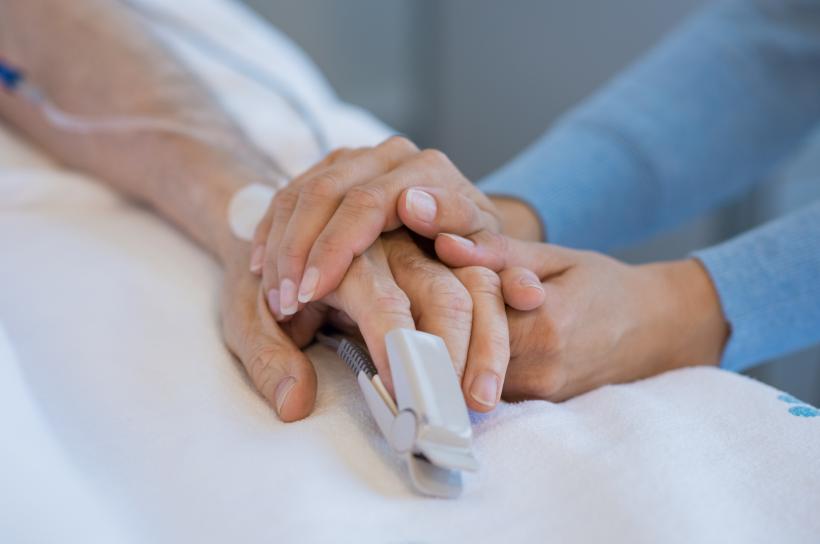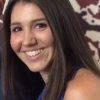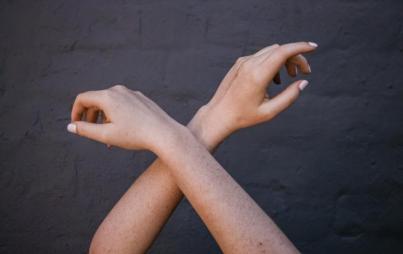
No one should ever be thankful for cancer, but I can say that I’m thankful for what it showed us.
Long Reads is a bimonthly feature, showcasing long-form essays.
The birthday cake sat on the counter, its cheerful pink frosting exclaiming, “Happy Birthday, Lexie!” I slowly put the plastic cover back on and put it back in the hospital room fridge. My mom and brother sat in silence. My dad didn’t even notice what I’d done — he was in the throes of yet another pain spasm. His body rigid, his eyes squeezed shut, his face contorted into a grimace.
I returned to my customary spot on the couch by his bedside, praying that my dad would get better, and that next year, we could really celebrate my birthday.
♦♦♦
In July of 2013, my mother and father sat all four kids down at the kitchen table and told us that my father had cancer. My brother (25) immediately left the room, my older sister (29) started talking about how she wasn’t strong enough to handle this, my younger sister (18) sat at the table in silence, and I (26) immediately went into help mode.
“What kind of cancer do you have?”
“The doctors aren’t sure.”
“How far along is it?”
“They don’t know.”
“What’s the prognosis?”
“There isn’t one.”
That answer — more than any of the others — scared me senseless.
I couldn’t imagine a world without my dad in it, and the fact that the doctors had no idea what to make of my dad’s cancer was terrifying. My dad went to get my brother, and when they came back, my parents told us what they did know: Thirty years earlier, my dad had had his colon removed, and a J-pouch was created. The cancer had been found in the smallest corner of the J-pouch; the pouch had to go. In a departure from normal procedure, my dad was told that he would need to have surgery first. His surgeons at Dana-Farber felt that he was too symptomatic not to.
The word cancer ricocheted around my head like the old Microsoft screensaver, bouncing off the walls of my brain, changing colors from blue to red to green to yellow and back again.
I’d never had someone so close to me diagnosed with cancer. What made it worse was that of anyone in my family, my dad and I are the most alike. We’re both introverts who prefer to spend time by ourselves, like to be left alone, and are meticulous planners who don’t leave anything to chance. I have my dad’s fair skin that burns when it’s cloudy, and his mole on my chin. And my dad gave me my love of soccer, something that has continued to bring us closer together over the years.
We’ve always had a special bond, so this news hit me especially hard. Perhaps what hurt most, though, was the irony of the fact that my father was a family physician. For thirty-five years, he had diagnosed this disease countless times in his patients. Now, it was his turn to be diagnosed.
As I drove home to my house that night, tears streamed down my face. I couldn’t stop them. The word cancer ricocheted around my head like the old Microsoft screensaver, bouncing off the walls of my brain, changing colors from blue to red to green to yellow and back again. That night, I had my first of many nightmares.
“Noooooooooooooooooooo!!!” I shot up out of bed, tears streaming down my face, my breath coming in short gasps. The clock at my bedside glared at me, the numbers pulsing an angry red 3:22 AM. I’d just had a nightmare where my dad died from the cancer. I couldn’t save him. Instead, I’d watched him die. It took me a long time to get back to sleep, and the nightmares continued to plague me for months.
Work the next day was a fight. Nothing seemed to matter except the fact that my dad had cancer.
“Are you as upset as I am?” I texted my brother.
His answer was simple: “Yes.”
I was so distraught that I couldn’t even say the word cancer. It took me a week to be able to tell my manager at work what was happening, and even then I couldn’t do it without breaking down. I didn’t tell my friends. I couldn’t.
As much as I knew it wasn’t true, I couldn’t help but think that not saying it kept it from being real.
On August 27, 2013, my dad finally had surgery. It had taken Dana-Farber two months to schedule the surgery because they needed a whole team to perform it. There was a dermatology team, an abdominal team, a urology team, and a plastic surgery team. My mom told us later that she met close to 25 people that day—nurses, doctors, assistants, and fellows.
My dad’s cancer was not common — he was only the 27th person in the world with this type of issue. The surgery was expected to take 6-8 hours. I met my mom at the hospital around noon, she’d been there since six that morning. Hours went by, we heard nothing. My brother joined us around seven that evening, and we still didn’t have any news. Finally, 11 and a half hours after surgery began, we got word that it was done.
The estimated time for recovery following a pouch reversal surgery is five to seven days. My dad was in the hospital for 22 days.
Every day after work, I would get in the car and drive directly to the hospital. Most days my mom was there as well. Some days my brother was also there, but on other days, it was just me. His intestines were slow to wake up, meaning he couldn’t eat, and he was in excruciating pain. I would sit on the couch next to his bed watching him writhe in agony, knowing there was nothing I could do to help him. While I couldn’t take away his pain, I could help him in other ways. I became acquainted with all of the nursing staff. I knew where to find water, ice, sponges, syringes, etc. I made sure my dad always had cold water and ice, I learned how to put on and take off his compression wraps for his legs, and I learned how to hook and unhook his tubes and wires for our many walks around the pod.
“How many laps do you want to do tonight Dad?”
“Maybe just one more.”
“Ooh, look at that — a pink sign! I wonder what pink means?”
I tried to distract my dad while we walked, ever so slowly, around the pod. I didn’t want him to think about the pain, or the fact that he wasn’t getting better as quickly as he should have. So I pointed out weird signs, told him about my day, and kept up a steady stream of chatter. In the earlier days, my dad wasn’t really able to have conversations, but I knew he still listened to everything I said and appreciated that he wasn’t alone.
The morning of my birthday dawned and I was flooded with messages, but one message stood out from the rest. “Happy birthday Lex.” It was from my dad, who had barely any strength, and this text was probably one of the first he had sent in almost a month. It made me think that he was getting better, and I was thrilled to go see him that afternoon after work. But when my mother, brother, and I got there, my dad was in excruciating pain. He wanted to celebrate my birthday, but the pain was too great.
We waited, hoping it would get better, but it didn’t. I put my birthday cake back in the fridge, and didn’t even mention it.
I curled up on the couch next to my dad and watched as first my brother and then my mother left. My mom urged me to leave, but I couldn’t, not while my dad was in so much pain. He’d told us how much he disliked being alone all day long, and I didn’t want him to be alone any longer than he had to be. I stayed until he fell asleep.
As the weeks went on, my dad began to gain more strength. He was eager to get back to work, so we started him with something small. My mom would bring mail from home, and I would sit with him and help him open it, catalogue it, and determine what should be done with it. My dad began to feel well enough to watch TV, so I watched football with him, something I had no real interest in. But I asked questions my dad could answer, and I think he liked that we had a new interest to share.
You Might Also Like: I've Never Met The Nurse Who Saved My Life
Towards the end of September it became clear that my dad would soon be well enough to go home. But he was not allowed to drive, was still weak, and would need help changing his ostomy (a surgically created opening in the body for the discharge of body wastes). Someone would need to be with him at all times. My older sister was in Florida, my younger sister was in college, my brother was traveling a lot for work, and my mother had just started a new school year. That left me. Thankfully, my work was incredibly understanding, and they let me take two weeks off to take care of him.
Before he left the hospital, my dad learned that the pathology reports showed he had one positive node out of 25. He would need to have chemotherapy, and then radiation. Coming home was bittersweet for my dad because he knew the fight wasn’t over.
♦♦♦
For the first two weeks he was home, I helped my dad with everything. I made all of his meals, drove him to doctor’s appointments, to his office so he could check in with his staff, and changed his ostomy.
“Ah crap!” My dad was lying on his back on the bed in the first floor bedroom as green waste spewed unchecked from his ostomy.
“It’s ok, we’re not going anywhere. We have time.” I rushed to get a towel under him so the waste wouldn’t destroy the bedspread.
“Get me a paper towel!”
“I’m getting it. It’s ok. No big deal.” I tried to calm my dad as best I could. After having been the doctor for so many years, being the patient was hard. I knew he was self-conscious about the ostomy, and he hated that he wasn’t well enough to take care of himself. But I just kept reassuring him that everything was fine and acted like it was just a normal day.
Chemotherapy started late in October, and it ravaged my dad. He developed a blood clot in his leg, mouth sores, lost his appetite, and his hands were always freezing. Thankfully, my dad’s brilliant mind was totally intact, and we had many a conversation about our lives and my goals as we drove to and from Dana-Farber. I had been considering going to grad school before my dad got sick, and we spent some time talking about the pros and cons of the various programs I was looking into and potential career paths. I valued these conversations between just the two of us, and I had never had so much uninterrupted time with my dad before.
The chemotherapy sessions were long and uncomfortable. We’d sit in the waiting room or the chemotherapy area and I’d look at those around me.
Every once in a while, I saw someone who was alone, and it reminded me how lucky we were to have each other.
Neither my dad nor I wanted to be there, but at least we weren’t alone, and we made the best of it. We both love country music, so I would set up country video playlists on my computer, and he and I would watch them together during the chemotherapy. We’d comment on the videos and artists, remarking on what we liked and didn’t like. Other times, I would leave him to watch them on his own while I would read a book. It didn’t matter that we weren’t talking — it was enough that my dad wasn’t doing this alone.
By Christmas, the effects of the chemotherapy were too great and my dad was forced to stop. He also needed to take a month off before he could start radiation. Christmas is a special time in our house, made even more so by the fact that my dad was born on Christmas day. That year, we truly had a lot to celebrate.
My parents always remark on how much of a help I was during my dad’s cancer, but what they don’t realize is how much my dad and his cancer helped me.
My dad soon went back to work part-time, managing his patients and his radiation treatments during early 2014. In July of that year, my dad’s first scan came back completely clean, and we were thrilled! It was time for vacation, but on the flight down to Florida my dad noticed what he believed to a blood clot. When he came home it was confirmed; my dad was forced to take anticoagulants and he could not do any kind of contact sport for six months.
This was devastating for my dad. As long as I have been alive, my dad had always played soccer. He lived for his weekly games, and when I was younger I used to love tagging along. It was because of my dad that I grew up playing and loving soccer, so much so that I worked for the professional soccer team in New England, the Revolution, for seven years. I commiserated with my dad and did my best to cheer him up. When my dad was going through chemotherapy, I'd gotten him club seats to a playoff game. Now, I just kept reminding him that he would get there, he would play again. In 2015 that dream came true, and it was one of my proudest moments to watch my dad get back out on the field. I knew how much my dad wanted it, and he had the drive and determination to make it happen.
Four years and some bumps in the road since that day my parents told us the news, my dad is cancer-free, working full-time, and playing soccer every weekend.
I know that many others who hear the word cancer aren’t that lucky. And cancer hasn’t left my family alone — my brother was diagnosed with cancer in late 2016. Thankfully, his case was caught early and he is fine.
My parents always remark on how much of a help I was during my dad’s cancer, but what they don’t realize is how much my dad and his cancer helped me. I’d never had to rework my life in such an exhaustive and all-encompassing way, but I did it. Life, as they say, is messy, and this time period was no exception. I learned how to rely on family and friends, and to truly appreciate every moment that we have together. As macabre as it sounds, my dad’s cancer also helped me prepare for the time when my parents are no longer here. I hope that time is far, far in the future — but it will come. And being able to think about it now will help me better prepare for it when it does happen.
Four years ago, I thought my dad’s life, and subsequently my whole family’s lives, were over. No one should ever be thankful for cancer, but I can say that I’m thankful for what it showed us.
Our family banded together, supported each other, and made the most of the experience. We learned to like hospital food, cracked jokes about my brother healing my dad with reiki, and made sure to support each other as best we could. It showed us that in times of darkness, you can find light, and that light is what you hold on to. That light is what makes the darkness bearable. I would never have survived this experience without my family, and having them constantly on hand made it doable. We knew that the only thing we could do was to laugh, and so we did, as long and as often as we could. Cancer is not fun. It is not fair. But it is not going to break us. At the end of the day, life — even a cancer-stricken one — was better because we were in it together.








